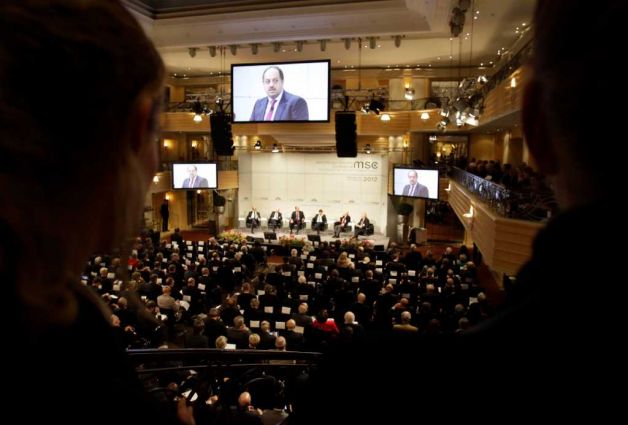
Frozen Conflicts Seen as Russia’s Door into “Euro-Atlantic Security Community”
Publication: Eurasia Daily Monitor Volume: 9 Issue: 28
By:

The Euro-Atlantic Security Initiative (EASI), a high-profile group of Western and Russian authors, proposes Western accommodation with the existing situation in the four post-Soviet conflicts (Transnistria, Abkhazia, South Ossetia, Karabakh). EASI has presented a study with policy recommendations, “Historical Reconciliation and Protracted Conflicts,” to NATO at its annual Munich conference on February 3-4. A companion study by the same group, “Toward a Euro-Atlantic Security Community,” contains some of the same recommendations about those four frozen conflicts under the “human security” rubric. Both documents are being submitted for consideration at NATO’s summit in Chicago in May (EASI Working Group: “Historical Reconciliation and Protracted Conflicts” and “Toward a Euro-Atlantic Security Community,” https://www.carnegieendowment.org).
Since NATO recuses itself from peacekeeping or crisis-management in the post-Soviet conflicts, EASI’s use of NATO as a launch pad for these recommendations may seem surprising. EASI does not mention NATO at all in connection with these “protracted” conflicts (it makes a few passing references to NATO in the Balkan conflicts of the 1990s). Clearly, EASI’s recommendations do not address NATO as an alliance. The priority addressees are the United States and individual NATO member countries in the dual capacity of most of them as European Union members. It is the US and EU, not NATO, who are being asked to cooperate with Russia in conserving the existing situation on the ground in those conflicts.
These recommendations form part of EASI’s grand design for a “Euro-Atlantic security community” (“security community in the wider Euro-Atlantic region”) in which Russia would be a leading participant alongside the EU and US. The NATO alliance goes practically unmentioned, and the OSCE would be employed as platform for some transactions among the main players. If taken at face value, this is a version of “Euro-Atlanticism” with Russia in a decision maker’s role and without an explicit role for NATO.
EASI regards the “regional disputes in the area of the former Soviet Union” as a “serious obstacle to creating a security community in the larger Euro-Atlantic region,” “threaten[ing] to undermine efforts to build Euro-Atlantic cooperation” (Euro-Atlantic meaning the West and Russia in this innovative terminology). EASI calls for circumventing that obstacle: partly through Western acceptance of Russian interpretations of the conflicts, and partly by conceding a lead role to Russia (implicitly or explicitly) in handling these conflicts. This concession starts from the composition of the authors’ group, where the Russian government is heavily represented while the Georgian, Moldovan, or Azerbaijani governments are not represented, and their views are ignored.
The policy recommendations are far from detailed; instead, EASI uses the broad brush while reserving many of the specifics for follow-up discussion. The recommendations begin at the level of definitions and semantics. Russia is never identified as a party to the conflicts in Georgia and Moldova. Despite Russia’s military interventions and presence within those countries, EASI in line with Russia’s view portrays those conflicts as involving only local “parties” (Abkhazia and South Ossetia versus Georgia; and even the “Transnistrians” [sic] versus Moldovans). EASI claims that “the post-Soviet conflict zones [Transnistria, Abkhazia, South Ossetia, Karabakh] are zones of undetermined sovereignty,” but this contradicts the international consensus, which recognizes Moldova’s, Georgia’s, and Azerbaijan’s sovereignty in those territories.
EASI uses the term “borders” referring to the Russian-drawn lines that separate Abkhazia and South Ossetia from the rest of Georgia. It makes no reference to Georgia’s internationally recognized territorial integrity, implicitly endorsing Russia’s position against that of the US, EU, and NATO on these issues. EASI uses the awkward term “Georgia conflicts” to avoid implicating Russia as a party to the conflict.
The authors identify the defunct Soviet Union, rather than Russia, as responsible for these conflicts. EASI attributes them to “the legacy of the failure of the Soviet system to manage disputes between autonomous areas and Union republics’ capitals.” No mention is made of Russia underwriting the secessions militarily, economically and politically during the intervening 20 years.
EASI takes no position on how, when, or indeed whether to resolve these conflicts in ways that would change the military and political situation on the ground. Instead, prevention of clashes and “making life more secure and more bearable for the people most directly affected by the conflicts should be the top priority.” This approach, at least, seems consistent with established Western policies, emphasizing those worthwhile but minimalist goals, while de-prioritizing the resolution of the conflicts. This is how the conflicts became “protracted,” and the region turned unnecessarily into an insecure “grey zone.”
However, EASI proposes an entirely new setup for political negotiations, dubbed a Joint Stewardship by the EU, Russia, and the US (in that order). This setup would handle security issues in Eurasia, with a corresponding Plan yet to be drafted, and using the OSCE as a possible implementing mechanism (see accompanying article).
On the whole, the recommendations emphasize minimal tinkering with those conflicts, in an open-ended process over time, rather than seriously attempt to resolve the conflicts. Conceding essential principles to Russia at the expense of international law, EASI renders the political solutions even more difficult than they already are. And it describes the proposed political negotiations as a means toward another end: a reordered “Euro-Atlantic Security Community” with Russia as one of the main decision-making centers.




